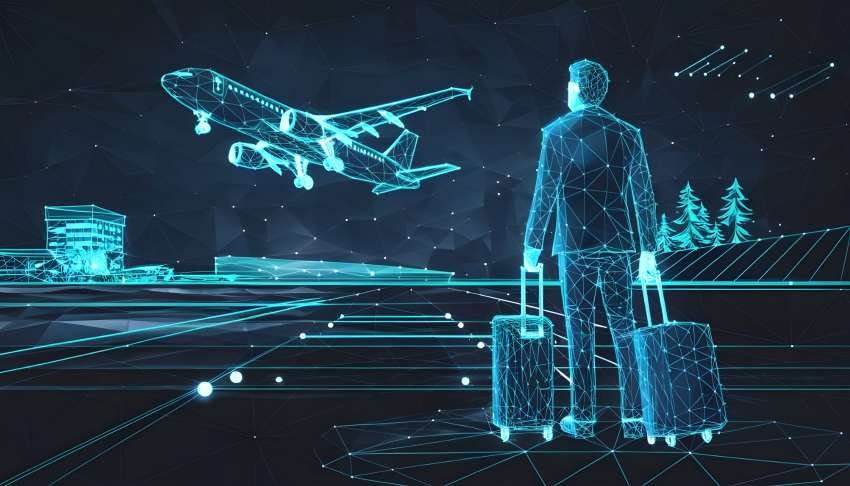AI in Travel
Caribbean Tourism Industry Welcomes AI Guidebook 2.0: A Comprehensive Resource to Help Businesses Integrate AI Responsibly and Effectively- Here’s All New Information Only For You

Monday, August 4, 2025
In a significant move to transform the Caribbean’s hospitality industry, the Caribbean Hotel and Tourism Association (CHTA) has released the “Artificial Intelligence Transformation Guide for Caribbean Tourism: Version 2.0.” This updated and expanded guide aims to provide Caribbean tourism stakeholders, including hotels, resorts, and related businesses, with practical tools and strategies to incorporate artificial intelligence (AI) into their operations. With a focus on maintaining the region’s warmth and cultural richness while embracing cutting-edge technologies, the guide is an essential resource for businesses looking to stay competitive in a rapidly evolving global tourism market.
Version 2.0 of the AI Guidebook builds on the foundation laid by its predecessor, released in 2024, by adding new case studies, exploring emerging AI trends, and showcasing real-world use cases across the Caribbean. The updated version also includes comprehensive strategies for data readiness, sustainable AI implementation, and the ethical governance necessary for the responsible use of AI in the hospitality industry.
Caribbean Tourism Industry’s Technological Shift
The introduction of AI into the Caribbean tourism industry represents a crucial step in digital transformation. Historically known for its hospitality, vibrant culture, and stunning natural landscapes, the region is now looking to technology to elevate its services, improve efficiency, and create more personalized experiences for guests. The AI Guidebook offers insights into the practical integration of AI tools in everyday operations, ensuring that technological advancements work in tandem with the human touch that is the hallmark of Caribbean hospitality.
The CHTA’s leadership in releasing this resource highlights the industry’s commitment to adapting to new technological realities. In a world where travelers increasingly expect seamless, tech-driven experiences, adopting AI can be the key to enhancing both operational efficiencies and customer satisfaction.
For Caribbean tourism businesses, AI offers a wealth of opportunities, from predictive maintenance that helps prevent equipment failures, to energy optimization systems that can lower operational costs. Guest personalization is another key area where AI can provide a significant edge, allowing businesses to offer tailor-made experiences that anticipate guests’ preferences and improve overall satisfaction.
AI Guidebook 2.0: Key Sections and Features
The AI Guidebook is structured around five key sections that offer a detailed roadmap for hospitality businesses aiming to implement AI technologies:
- Foundations of AI and Emerging Technologies: This section explains the basics of artificial intelligence and emerging technologies relevant to the hospitality industry. It provides an accessible introduction to AI, covering key concepts such as machine learning, natural language processing, and robotics, making it easy for business leaders to understand how AI can benefit their operations.
- Hospitality-Specific Use Cases: This section focuses on practical applications of AI in the hospitality sector. Examples include guest personalization, where AI can analyze customer preferences and past behaviors to recommend experiences and amenities; predictive maintenance, which helps hotels avoid costly equipment failures by anticipating issues before they arise; and energy optimization, which allows businesses to reduce their environmental footprint while saving on energy costs.
- Responsible AI Adoption, Data Privacy, and Governance: This section highlights the importance of implementing AI in a responsible and ethical manner. It covers key issues such as data privacy, transparency, and AI governance, ensuring that Caribbean tourism businesses use AI tools in ways that protect guest information and align with global standards for ethical technology use.
- Change Management and Staff Empowerment: AI is not just about replacing human labor but enhancing it. This section provides strategies for change management, helping businesses navigate the cultural and organizational shifts that come with adopting new technologies. It also emphasizes the importance of staff empowerment, encouraging businesses to invest in training programs that help their teams leverage AI tools to improve efficiency and customer service.
- Trends in AI Technologies: The final section of the guide explores emerging AI technologies that are reshaping the tourism industry, including AI agents, robotics, voice interfaces, and other innovations that promise to change the way customers interact with businesses and receive services.
By incorporating both high-level concepts and actionable strategies, the guide aims to make AI adoption approachable for businesses of all sizes and levels of technological readiness. It encourages businesses to start small, taking manageable steps to integrate AI at a pace that fits their resources and brand identity.
Embracing AI Without Losing the Human Touch
One of the key takeaways from the AI Guidebook is that artificial intelligence is not a replacement for human interaction, but a tool that enhances it. The Caribbean tourism industry is known for its warmth, hospitality, and personal touch, which are integral to the region’s charm. AI tools, when used correctly, can complement these qualities by streamlining operations, improving service delivery, and enhancing guest experiences without diminishing the personal connections that travelers seek.
For example, AI can be used to handle routine tasks such as check-ins, customer inquiries, and bookings, allowing hotel staff to focus on more complex and personalized interactions with guests. Similarly, predictive analytics can help anticipate guest needs and preferences, enabling staff to offer more tailored services, such as personalized welcome amenities or customized local experiences. In this way, AI can elevate the guest experience, allowing human employees to focus on delivering exceptional service.
Building Data Readiness and Sustainability
A significant challenge for many businesses in the Caribbean is data readiness. AI systems rely heavily on data to function effectively, and Caribbean tourism businesses need to ensure they have the infrastructure in place to gather, manage, and protect this data. The guide offers clear advice on how businesses can begin to collect relevant data, from guest interactions to energy usage, and how to store and process it in compliance with privacy laws.
The guide also emphasizes sustainable AI practices, encouraging businesses to use AI in ways that not only improve efficiency but also reduce the environmental impact of tourism. From optimizing energy consumption to reducing waste, AI can play a pivotal role in helping businesses adopt greener practices and contribute to the region’s sustainability goals.
Empowering Businesses Through Partnerships
In addition to the AI Guidebook, the CHTA has forged partnerships with organizations such as the Hospitality Financial and Technology Professionals (HFTP) and the Growth Advisors International Network (GAIN) to provide additional resources to its members. These partnerships offer access to educational content, expert-led sessions, and discounts on global tech platforms, helping Caribbean tourism businesses stay at the forefront of the digital transformation.
These partnerships provide CHTA members with the opportunity to connect with experts in the field and gain valuable insights into emerging technologies and trends. They also offer exclusive access to tools and platforms that can help businesses streamline their operations, improve financial performance, and enhance guest experiences.
AI’s Role in Future-Proofing Caribbean Tourism
The introduction of the AI Transformation Guide 2.0 is part of the Caribbean tourism sector’s larger effort to future-proof its businesses. With the global tourism industry facing numerous challenges, from economic uncertainty to environmental pressures, adopting AI can help Caribbean businesses stay competitive and adaptable. AI technologies provide the flexibility to scale operations, personalize guest experiences, and optimize resources, all of which are crucial for long-term success in an increasingly digital world.
As the Caribbean tourism industry continues to recover from the impacts of the COVID-19 pandemic, the adoption of AI will be critical in meeting the expectations of the modern traveler. Today’s travelers demand more personalized, efficient, and sustainable travel experiences, and AI offers the tools needed to deliver on these expectations. By embracing AI, Caribbean businesses can not only improve their operations but also create a competitive advantage in the crowded global tourism market.
Conclusion: A New Era of Caribbean Tourism
The release of the AI Transformation Guide for Caribbean Tourism: Version 2.0 marks an important step in the region’s journey toward digital transformation. With AI set to play an increasingly significant role in shaping the future of tourism, the guide provides Caribbean hospitality businesses with the knowledge and tools they need to adopt AI responsibly and effectively. By embracing these technologies, the Caribbean tourism sector can enhance operational efficiency, offer personalized guest experiences, and maintain the human touch that has made the region a beloved destination for travelers worldwide.
As AI continues to evolve, Caribbean businesses must stay proactive and adaptable. The CHTA’s AI Guidebook is a timely resource that empowers stakeholders to integrate AI into their operations, ensuring they remain competitive and prepared for the challenges and opportunities of tomorrow’s tourism industry.
AI in Travel
Virtuoso’s fourth travel tech summit to focus on AI

Virtuoso says there has been so much demand for this year’s Travel Tech Summit, which focuses on using smart technology to elevate and enhance human connection, that it had to double capacity.
The event, to be held on 9th August 2025 in Las Vegas, will bring together 500 advisors, partners and tech leaders.
Dedicated to innovation within the luxury travel industry, the summit will be led by tech entrepreneur, investor and Virtuoso Board Member Gilad Berenstein.
Berenstien says, “In previous years, we’ve focused on showcasing ideas and innovations from outside of Virtuoso for mutual learning, which has fuelled an ecosystem of startups tailoring their systems and products for travel advisors”.
“This year, we are highlighting technology developments from within Virtuoso. Thanks to the evolution of Virtuoso’s Tech Innovation Program, the level of tech sophistication in the network has grown exponentially.”
Berenstein says this year’s summit aims to “empower advisors and partners to dive further into the developments available to them through the global network, celebrate in-house innovation and, most importantly, walk away with actionable steps and inspiration they can incorporate into their own businesses”.
Virtuoso Senior Vice President, Technology Paul Kearney will also share efforts to “standardise and modernise a more collaborative travel tech environment where systems interoperate smoothly and securely”.
He says, “in technology, the global network is focused on building systems that support the unique needs of each agency, advisor and partner”.
“Our approach is rooted in the belief that no single solution fits every business – which is why we’re investing in a flexible, interoperable ecosystem that brings together the tools and platforms our network relies on.”
Other notable speakers include:
- Betsy Grebinoski of Pique Travel and Fernanda Barrence of The Trip Boutique – an AI-powered platform that assists advisors in delivering personalised recommendations. They will discuss what an “agency brain” is and why Pique is deploying one.
- Dianna Rom of Windstar Cruises and Jared Shalhoub of AmaWaterways will discuss how they are using virtual reality (VR) media to evolve from static virtual tours to dynamic, multimedia-rich immersive experiences.
- Vincent Shacks of Wilderness Destinations will talk about using tech to keep lions and livestock safe in Botswana’s wildlife-rich Okavango region, where conservation partners are using a real-time Lion Alert System powered by GPS collars and geofencing.
- Rafat Ali, CEO and founder of Skift, will explore the intersection of travel technology and innovation, covering the impact of shifting geopolitics, evolving consumer behaviour, workforce dynamics, demographic shifts and how these forces are influencing the travel ecosystem.
For more information, see Virtuoso.
AI in Travel
APAC travellers lead in AI adoption, reveals report

Booking.com‘s The Global AI Sentiment Report 2025 revealed that respondents in the Asia Pacific (APAC) region showed the highest willingness to integrate AI into their daily lives, with 41% using AI for education and a similar share for transportation.
It also revealed that the region ranked 2nd globally in enthusiasm and familiarity with AI (95%), next to Latin America (LATAM) (98%).
AI and travel
AI has been proven helpful in travelling, with 65% of consumers expecting autonomous trip planning to go mainstream soon; 67% have already used AI in some aspect of travel.
Travellers most often use AI to research destinations and the best time to visit (38%), find local experiences or cultural activities (37%), and receive restaurant recommendations (36%) during trip planning. AI assistants are becoming a trusted source for planning travel (24%) than colleagues (19%) or influencers (14%).
During the trip, travellers use AI tools for translation capabilities (45%), in-destination activity suggestions (44%), restaurant recommendations (40%), and navigating unfamiliar locations or transport systems (40%).
After returning home, 38% of respondents use AI for photo editing.
Travellers express that AI significantly enhances their travel experiences, making it easier and more efficient (66%). It helps them steer clear of overcrowded destinations or peak travel times (71%), and discover experiences that positively impact the local places they visit (60%).
“Generative AI represents one of the most significant technological shifts of our era, fundamentally reshaping how consumers engage with the world around them. As this technology matures, it’s not only transforming how companies like ours anticipate and meet evolving customer needs, it’s also raising the bar for what travellers expect from every interaction,” says James Waters, chief business officer at Booking.com.
AI in Travel
Travel Startup Funding Declines in 2025: How Global Uncertainty and AI Innovation Shape Investment Opportunities in Travel Tech

Sunday, August 3, 2025
The global context seems to have an impact on the travel industry’s slowing down of the travel industry’s funding, especially during the start of 2025. In the travel tech segment, the dip in funding of $1 billion to travel tech startups in the first quarter of 2025, along with the $800 million in investment noted in the second quarter, appears to be indicative of a period of volatility. During the preceding year, a range of global conflicts, as well as concerns with regard to tariffs and political situations, have caused the tech travel sector to be treated with far more caution.
The travel industry pandemic rebound period seems to booster the industry’s funding in the lead up to 2025 with a projection of receiving $16 billion in 2021. In stark contrast to the $5.5 million noted in 2024, the expectation of $4 billion investment during 2025 serves to indicate that the funding available to industry startups is on the decline. Through 2025 the other expectation is framed on these values, the continuing dip on travel tech funding caters to fears surrounding economic instability, attitudes toward risk, the pace of tech synthesis, and funding available.
The Effects of Global Uncertainty on Funding for Travel Startups
The Global Economic Uncertainty report on Travel Startups Funding states that emerging technologies, especially artificial intelligence, have a considerable impact on funding Artificial Travel Startups. Coupled with the rising tariffs, political unrest, and fluctuating currencies, travel startups AI technologies, the funding for AI Travel Startups has decreased tremendously. All of the above factors have led to an investors’ selective approach when it comes to travel startups.
The travel industry, in particular, is one that has suffered a great deal of complexity in terms of financing. Travel startup businesses that used to flourish and expand at a rapid have suffered a great deal during and especially for investors back in 2025. The COVID-19 global pandemic has led to the emergence and interrelations of previously un-imagined factors of business such as systematic travel, systematic economy, irrational travel policies, and artificial investments.
Travel Technology Startups and Investment Innovation Trends
The COVID-19 pandemic has led to unforseen and un-imagined global, economic, social and business factors. Travel technology startups have managed to increase their funding and investments. The fact that they managed to secure funding during such a rough economic period, serves as a good example. Corporates such as Fora, Holodi, Canary and Ramp have dramatically shifted the investment paradigm due to their lack of panic during financial results of investors back in 2025.
As an example, Ramp, focused on financial management for businesses with a technology platform, received $200 million in funding. Canary Technologies, for its part, raised $80 million as a provider of enterprise-grade technology solutions for hospitality. Fora, a quickly scaling travel advisory, received $60 million for further investment into their services. Still, contracting investor confidence has caused most other startups to receive funding under $10 million, a trend that captures a wider scope of diminished investor trust.
Onfly, a travel tech startup that was featured in PhocusWire’s Hot 25 Startup list for 2022, did manage to receive $40 million, which is a notable exception. This is, in fact, a good sign for startups that are innovative and manage to distinguish themselves in a competitive space.
The Difficulty in Receiving Funding for Early-Stage Startups
In comparison, early stage startups have had a more difficult time securing funding, as large rounds of funding continue to be obtained. Pre-seed and seed rounds have dramatically declined, with only a very small number of firms able to secure funding. In the last few months, Juno, Travaras, and Airial Travel, raised a modest but still notable $1.4 million to $3 million each.
The AI-powered environment poses additional challenges due to a lack of funding. The potential of AI is not lost on travel startups, but most investors are wary due to the overselling of AI technologies. The ability to make use of AI in the appropriate manner is viewed as a key determinant of a startup’s attractiveness to investors. However, given the travel industry’s uncertain landscape, investors are unwilling to pour substantial money into early-stage ventures that lack a track record.
Travel Tech Investment Outlook
Despite these hurdles, a number of leading travel tech investors have expressed optimism, particularly with respect to funding in the growth and later stages, which suggests that early-stage funding is more challenging to secure. These investors are optimistic about the funding climate toward established travel tech firms that have proven their business model and success.
According to some specialists, the travel technology industry has transitioned from a mere subsection to a fully-fledged vertical, complete with defined routes from conception to IPO. Investors now understand the industry thoroughly. This particular aspect of market maturity may contribute to the increased optimism regarding growth-stage companies tailored for investment.
The funding optimism for companies initiating later-stage funding aligns with broader investment industry trends. The ongoing refinement of travel technology companies and the meticulous scaling of their operations has rendered the preceding journey to a lucrative exit—either via IPOs or mergers and acquisitions (M&A)—more streamlined, thus increasing their appeal to strategic investors.
M&A Activity and the Quest for Exits
As funding becomes more challenging to secure, some startups are now seeking out mergers and acquisitions (M&A) activity as a strategy to gain an exit. While the year-over-year M&A activity for the second quarter of 2025 was rather tame, there were a couple of significant deals. For instance, Marriott continues to pursue companies that help enhance their lines of business by purchasing CitizenM for $355 million. Likewise, some major players in the travel sector are seeking to divest non-core assets, as exemplified by the $1.1 billion acquisition of Sabre’s hospitality business by TPG, thus creating opportunities for startups to be absorbed.
Consolidation becomes the order of the day in travel tech, and these deals showcase this trend. The once attainable funding for independent startups is now turning out to be more of a challenge, thus enabling organic growth via acquisitions is a more plausible strategy for many.
Both the lack of funding and the hurdles that startups need to overcome brings forth an interesting hypothesis that, for many companies, M&A activity will become a more commonplace strategy to pursue in the upcoming months. This trend, primarily driven by the desire to exploit new technologies that can be assimilated into their business operations, can be observed for some time.
The Importance of IPOs Within the Travel Tech Sector
Concerning the travel sector, IPOs have recently shown some hopeful signs, even if funding and acquisitions remain sluggish. Companies such as Navan Travel are openly announcing their plans to IPO, which signals confidence in the market’s potential over the long run. These IPOs offer the possibility of fulfilling the liquidity needs of travel startups and could serve as an indicator for others who are contemplating going public in the future.
The combination of the prevailing global economic uncertainties makes the route to IPO even more difficult. As the travel sector works through the various challenges, companies will have to demonstrate some value in their resilience and adaptability prior to being exposed to the IPO public offering scrutiny.
Final Thoughts: Where to Travel Tech Startups Look for Investment in the Future?
As noted, the forecast decline in startup investment in travel tech for 2025 is consistent with prevailing global economic trends. These include some degree of global conflict, rising tensions between major global players, and political ‘vagueness’ all resulting in an investment ‘wait and see’ approach. While some investors are still able to fund travel tech companies, investment in early-stage companies is more difficult than ever.
Notwithstanding these challenges, the outlook for travel startups remains optimistic. There will invariably be investment in the market’s maturation’s later stages. In addition, continued efforts by travel tech companies to optimize their business models and enter new markets will drive further consolidation and innovation by enhancing the potential for mergers and acquisitions and IPOs.
Startups willing to adapt to current conditions in the travel sector must be agile and forward-looking. In the context of sustainability, artificial intelligence, new business models, and a looming global unpredictability, the next phase will likely be dominated by companies that endure the test of innovation against resilience.
-

 Brand Stories2 weeks ago
Brand Stories2 weeks agoBloom Hotels: A Modern Vision of Hospitality Redefining Travel
-

 Brand Stories1 week ago
Brand Stories1 week agoCheQin.ai sets a new standard for hotel booking with its AI capabilities: empowering travellers to bargain, choose the best, and book with clarity.
-

 Destinations & Things To Do2 weeks ago
Destinations & Things To Do2 weeks agoUntouched Destinations: Stunning Hidden Gems You Must Visit
-

 Destinations & Things To Do1 week ago
Destinations & Things To Do1 week agoThis Hidden Beach in India Glows at Night-But Only in One Secret Season
-

 AI in Travel2 weeks ago
AI in Travel2 weeks agoAI Travel Revolution: Must-Have Guide to the Best Experience
-

 Brand Stories1 month ago
Brand Stories1 month agoVoice AI Startup ElevenLabs Plans to Add Hubs Around the World
-

 Brand Stories3 weeks ago
Brand Stories3 weeks agoHow Elon Musk’s rogue Grok chatbot became a cautionary AI tale
-

 Asia Travel Pulse1 month ago
Asia Travel Pulse1 month agoLooking For Adventure In Asia? Here Are 7 Epic Destinations You Need To Experience At Least Once – Zee News
-

 AI in Travel1 month ago
AI in Travel1 month ago‘Will AI take my job?’ A trip to a Beijing fortune-telling bar to see what lies ahead | China
-

 Brand Stories2 weeks ago
Brand Stories2 weeks agoContactless Hospitality: Why Remote Management Technology Is Key to Seamless Guest Experiences













You must be logged in to post a comment Login